Gaza: Roosters compete with the call to prayer, by Gerri Haynes
(Gerri Haynes, a former president of Washington Physicians for Social Responsibility, is once again sending back reports from inside blockaded Gaza. As she did four times before, Gerri has organized a team of doctors and other health care providers to work in hospitals and clinics in Gaza in an effort to directly help the people there and to bring attention to the ongoing humanitarian crisis that the Israeli blockade has created. Fifth in the series.)
I wish I could send you the sound of the roosters that crow outside our window. One has a strong “roostery” call; the other has an altered and aged sound. As they communicate with one another, the 4am call-to-prayer competes with their conversation – the air is full – another day begins in Gaza.
This morning some members of our group met with an official of the Gaza City Municipality – talking about the possibilities for building a healing garden. He is an architect and teaches in a Gaza university. His enthusiasm about Roxanne’s proposal to include students from his
university and the University of Washington in the planning and construction of a healing garden was wonderful. Roxanne toured some possible garden sites this afternoon – the options are many.We also met with the family of Dr. Abuleish, author of “I Shall Not Hate.” Two of Dr. Abuleish’s daughters and one niece were killed by Israeli tank fire of their house just before the end of Cast Lead (the Israeli attack on Gaza 2008/2009). Another daughter was nearly killed and we met with her today also. Dr. Abuleish’s wife had recently died of cancer and this grieving family’s response to their sadness is part of his story.
This afternoon, we delivered toys, school supplies, toothpaste, toothbrushes and soccer equipment – first to a local kindergarten and then to the orphanage. These gifts, provided by individual donors from Washington and Oregon – including many children – were enthusiastically received!
This afternoon also, I met with a woman whose elderly mother is dying in India. The woman has six children,
her husband has no work and she desperately wants to see her mother before her mother dies. She told me that she prays for someone to “adopt” one of her children – to save the life of one of her children by sending them money each month for food. Presently, her family is hungry. They are eating one meal each day and – the only money the family has comes from the sale of her inexpensive but beautiful handwork.Bob Haynes writes: “I was welcomed back to Al Awda Hospital today by the clinic staff and my cardiologist colleague, Majed Sultan, whom I have worked with for several years. In the midst of the mild chaos of the outside garden waiting area and the more crowded clinic hallways, there exists a gentle code of respect for their elders. In America dutiful daughters often bring their elderly parents to doctor visits. In Gaza, pride and respect, culture and the reality of soaring unemployment, mean that sons bring their parents for medical care. The level of medical expertise is high in Gaza but due to the siege and politics many medical supplies are limited. Additionally, continuing medical education is difficult to acquire – leaving and re-entering
Gaza is arduous and costly.”Steve Gilbert writes: “Underlying the many challenges in Gaza are policy decisions that affect public health. Two of the most glaring which particular effect children are lead and pesticide exposure. I met with Mr. Bahha Alagha at the Environmental Quality Authority and gave a lecture to about 40 people on pesticides. The use and over use of these materials results in ground water contamination, worker exposure, community exposure, and crop contamination with pesticide residue. Worker exposure occurs during mixing and application of organophosphate pesticides. Children are exposed to pesticides tracked into a workers car or home. Chronic infant and childhood exposure to pesticides harms a child’s nervous system and damages their learning and memory abilities. Tracking the amount and types of pesticides used in Gaza is challenging – most of the pesticides move through the Rafah tunnels from Egypt. Programs to provide training in the safe handling of pesticides and integrated pest management principles to
reduce organophosphate class pesticides are needed to protect the futures of Gaza’s children.Leaded gasoline also comes through the tunnels from Egypt into Gaza. This leaded gasoline is cheaper and more available than unleaded gasoline from Israel. Burning of leaded fuel is dangerous. Even low levels of lead exposure can damage the central nervous system. There are well-documented studies regarding the vulnerability of infants and children to even the smallest amount of lead exposure. The United States stopped adding lead to gasoline in the 1980s and childhood blood lead levels have dropped dramatically. We know what the problem is and how to fix it. Protection of children is essential – the use of leaded gasoline and pesticide exposure must be stopped. Children have a right to live in an environment that allows them to reach their full potential. “
1 Comment to “Gaza: Roosters compete with the call to prayer, by Gerri Haynes”
RSS feed for comments on this post. TrackBack URI
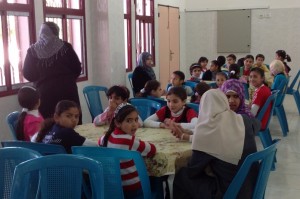
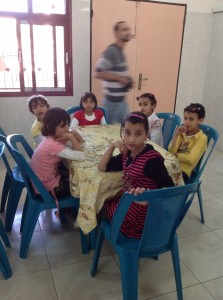
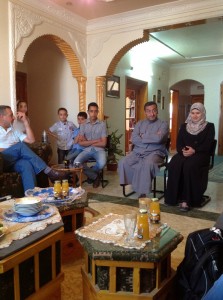
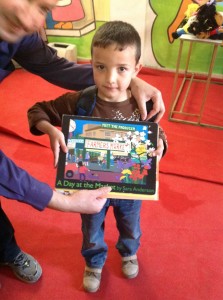
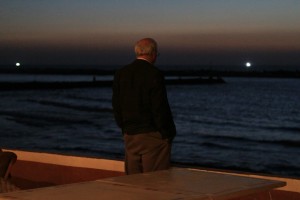
By Bert Sacks, April 23, 2012 @ 8:10 pm
Gerri and Bob Haynes are doing wonderful work, bringing some sense to the people of Gaza that the rest of the world has not forgotten them. I am exceedingly grateful to them, and to all the other members of the delegation, for representing us all in such a positive way. I thank you all.
I heard Dr. Abuleish when he apoke at Town Hall here in Seattle. At the time I understood that he was living and working in Canada. Has he moved back to Gaza now? If so, did you get to meet with him? I think everyone who heard him in Seattle was deeply impressed. I certainly was.